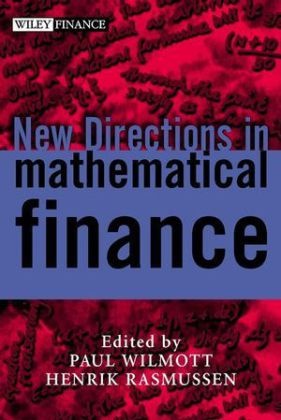Read more
Zusatztext "New Directions in Mathematical Finance" ist eine Sammlung von Beiträgender im Dezember 1999 in Mailand abgehaltenen Konferenz zum Thema Finanzmodelle.An der Konferenz nahmen führende Vertreter des Bereichs 'Quantitative Finance'teil! um aktuelle Techniken zur Modellbildung in verschiedenen Bereichender Finanztechnik zu diskutieren. Mit Beiträgen von renommierten Experten!wie z.B. David Bakstein! Isabelle Bajeux! Christer Borell! David Epstein!Aldo Nassigh und Henriette Prast. Herausgeber dieses Bandes sind Paul Wilmottund Henrik Rasmussen; sie sind für das einführende Kapitel und die Themenübersichtverantwortlich. Eine interessante und hochaktuelle Lektüre zu ausgewähltenThemen der Finanztechnik. Informationen zum Autor Paul Wilmott studied mathematics at St Catherine's College, Oxford, where he also received his D.Phil. He is the author of Paul Wilmott Introduces Quantitative Finance (Wiley 2007), Paul Wilmott On Quantitative Finance (Wiley 2006), Frequently Asked Questions in Quantitative Finance (Wiley 2009), The Money Formula (with David Orrell) (Wiley 2017) and other financial textbooks. He has written over 100 research articles on finance and mathematics. Paul Wilmott was a founding partner of the volatility arbitrage hedge fund Caissa Capital which managed $170 million. His responsibilities included forecasting, derivatives pricing, and risk management. Paul is the proprietor of www.wilmott.com, the popular quantitative finance community website, and the quant magazine Wilmott. He is the creator of the Certificate in Quantitative Finance, cqf.com, and the President of the CQF Institute, cqfinstitute.org. Paul Wilmott has been called "cult derivatives lecturer" by the Financial Times and "financial mathematics guru" by the BBC. Klappentext New ideas in quantitative finance are always welcome, especially so in recent years as new techniques have steadily gained in popularity and old techniques have become more sophisticated. This book features new contributions from many highly regarded individuals, collected together by Paul Wilmott and Henrik Rasmussen. Subjects featured include new techniques for: * Risk Management * Equity Modelling * Interest Rate Modelling This book is a worthy addition to the canon of literature on quantitative finance. Zusammenfassung Based around a conference on financial modeling held in Milan in December 1999, this book brings together the leading names in quantitative finance to discuss the modeling techniques in a variety of areas of financial engineering. Inhaltsverzeichnis Preface The Quantitative Finance Timeline (Paul Wilmott) Part I. New Directions in Equity Modelling Introduction Asymptotic analysis of stochastic volatility models (Henrik Rasmussen and Paul Wilmott) Passport options, a review (Antony Penaud) Equity Dividend Models (David Bakstein and Paul Wilmott) Isoperimetry, log-concavity and elasticity of option prices (Christer Borell) Part II. New Directions in Interest Rate Modelling Introduction Dynamic, deterministic and static optimal portfolio strategies in a mean-variance framework under stochastic interest rates (Isabelle Bajeux-Besnainou and Roland Portrait) Pricing bond options in a worst-case scenario (David Epstein and Paul Wilmott) Part III. New Directions in Risk Management Introduction Implementing VaR by Historical Simulation (Aldo Nassigh, Andrea Piazzetta and Ferdinando Samaria) CrashMetrics (Philip Hua and Paul Wilmott) Herding in financial markets: a role for psychology in explaining investor behaviour? (Henriëtte Prast) Further Reading Author Biographies Index...
List of contents
Preface
The Quantitative Finance Timeline (Paul Wilmott)
Part I. New Directions in Equity Modelling
Introduction
Asymptotic analysis of stochastic volatility models (Henrik Rasmussen and Paul Wilmott)
Passport options, a review (Antony Penaud)
Equity Dividend Models (David Bakstein and Paul Wilmott)
Isoperimetry, log-concavity and elasticity of option prices (Christer Borell)
Part II. New Directions in Interest Rate Modelling
Introduction
Dynamic, deterministic and static optimal portfolio strategies in a mean-variance framework under stochastic interest rates (Isabelle Bajeux-Besnainou and Roland Portrait)
Pricing bond options in a worst-case scenario (David Epstein and Paul Wilmott)
Part III. New Directions in Risk Management
Introduction
Implementing VaR by Historical Simulation (Aldo Nassigh, Andrea Piazzetta and Ferdinando Samaria)
CrashMetrics (Philip Hua and Paul Wilmott)
Herding in financial markets: a role for psychology in explaining investor behaviour? (Henriëtte Prast)
Further Reading
Author Biographies
Index

